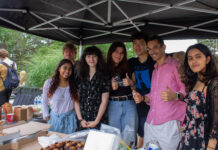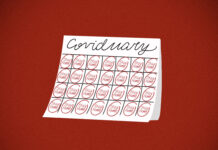The Waterloo Centre for German Studies (WCGS), alongside the French, history, and Germanic and Slavic studies departments, hosted the consuls general of Poland, France, and Germany for a discussion panel on dictatorship and democracy in Europe post-World War 1, Oct. 28. WCGS director Mathias Schulze introduced the panelists and curated the discussion period.
The four panelists included department of history chair Gary Bruce, Consul General of Poland Grzegorz Morawski, Consul General of France Jean-Francois Casabonne Masonnave, and Consul General of Germany Walter Stechel.
Morawski, Casabonne, and Stechel opened with remarks on the historic and current situations in their respective countries.
“After 40 years of communist rule, Poland was an…economically bankrupt country,” Marowski said. But he credits Poland’s transition after the ousting of the communist government in 1989 as being key to its current success.
“After only 25 years of independence, we are proud of today’s Poland,” he said. Poland was at the “edge of extremes,” with two totalitarian regimes: the Communists and the Nazis. Now, he said, its economy has grown faster than any other European country and was the only European country to avoid a recession in the financial crisis of 2008. “[Poland is] an example of successful transformation from dictatorship to democracy,” Marowski said.
In his opening remarks, Casabonne highlighted the importance of countries in the European Union (EU) continuing to work on democracy and to not forget atrocities committed in the past.
“We have to fight every week, every day, never thinking that it’s done and we can go on not fighting,” he said.
Casabonne also highlighted the importance of deepening ties in the EU. Recalling his tenure in Japan, Casabonne explained how Japanese residents expressed amazement at current French-German relations and how to apply their lessons to current Sino-Japanese and Korean-Japanese relations.
Stechel similarly discussed German views towards their history.
“[They] want[ed] to build a new country, but [they] failed,” he said of the technocrats of the National Socialistic German Workers’ Party. After the U.S.’ Marshall plan, “Germany [became] an economic giant, but a political dwarf.” Germany’s policy of west-orientation included coming to terms with France, ending “centuries of animosity that prevailed” regarding borders, and culminated in NATO membership.
Bruce ended the opening remarks with a warning regarding wars.
“Wars take on a life of their own, consequences cannot be known in advance…it is because of World War 1 that numbers with [many] zeros don’t mean much anymore.”
Panelists took questions from the crowd, including questions on the current Ukraine conflict and the establishment of the Schengen Area.
“Poland, like other European countries… support[s the] Ukranian fight for freedom and independence,” Markowski said. “Ukraine is at the point where Poland was 25 years ago… There is hope for Ukraine.”
Casabonne agreed with Markowski.
“We should never forget that history is a tragedy… and [Ukraine] is a good example where Europe forgot that.”
Stechel seconded this approach, saying that Europe needs to work on deepening and enlarging the EU.
“Sometimes I feel we are in the middle of a river, and we have to construct the bridge to the other side.”
WCGS’s next event is a public lecture titled “Recreating Nature: German Romantic Landscapes as Cultural Ecology.”































